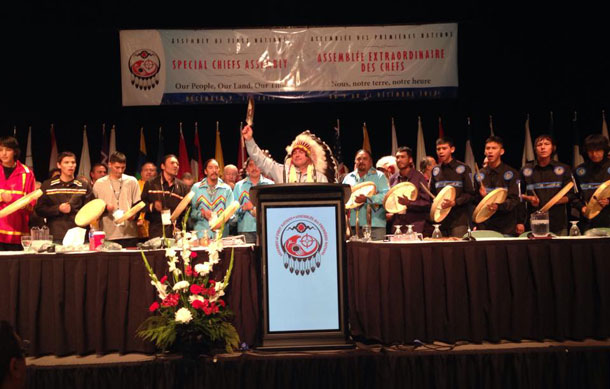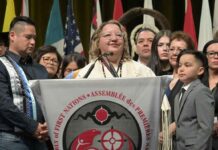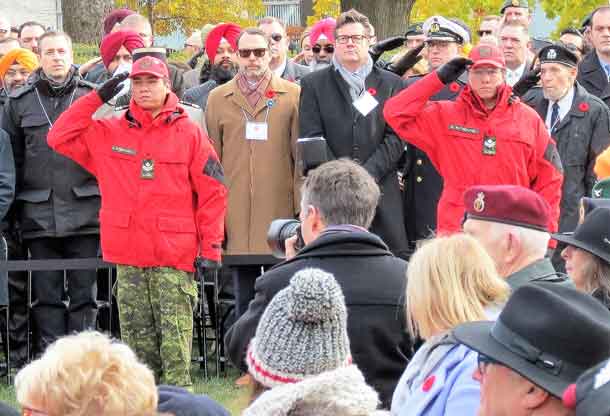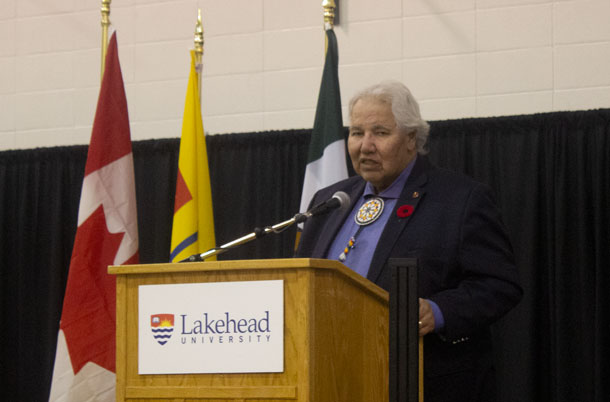 OTTAWA – Almost 1,500 Chiefs, Elders, youth and other delegates attended the AFN Special Chiefs Assembly (SCA) in Ottawa, Ontario held December 5 – 7. First Nations gathered under the theme “Our Languages, Our Land, our Future” to discuss key priorities and set direction for the coming year. Issues and challenges were identified, along with areas where there is momentum and progress. This Bulletin provides an overview of key areas of discussion.
OTTAWA – Almost 1,500 Chiefs, Elders, youth and other delegates attended the AFN Special Chiefs Assembly (SCA) in Ottawa, Ontario held December 5 – 7. First Nations gathered under the theme “Our Languages, Our Land, our Future” to discuss key priorities and set direction for the coming year. Issues and challenges were identified, along with areas where there is momentum and progress. This Bulletin provides an overview of key areas of discussion.
First Nations languages have been a priority for many years. Delegates discussed the work to co-develop an Indigenous Languages Act, announced in 2016, that aims to ensure First Nations languages are recovered, revitalized and restored. The AFN held a series of regional Engagement Sessions that will guide its work, and the AFN will ensure the federal government fulfills its duty to engage properly and respectfully with First Nations. The goal is to have the legislation in place sometime in 2018.
First Nations education is an area where significant progress is underway. First Nations are working with federal counterparts on a Memorandum to Cabinet to unlock more than $650 million in funding for First Nations students, schools and education systems. The approach is based on First Nations control of First Nations education, and respect for First Nations rights, jurisdiction and Treaties. First Nations will be able to organize themselves in any way that works best for them to receive this funding. It is clear that First Nation governments will receive more funding to support First Nations education in 2018. Minister of Indigenous Services Jane Philpott affirmed publicly that education is a Treaty right, something First Nations have always known, but it’s the first time a federal cabinet minister has publicly acknowledged this reality.
First Nations are calling for action to address the situation of children in care, a situation Minister Philpott admitted is a “humanitarian crisis”. Minister Philpott committed publicly in her remarks to the Assembly that the next federal budget will close the gap in funding for First Nations child welfare. First Nations have been strongly pushing for this, and AFN held a National Day of Action on First Nation Child Welfare in November. The Minister’s commitment is long overdue, especially in light of the Canadian Human Rights Tribunal decision in response to the complaint brought forward by the AFN and the First Nations Child and Family Caring Society, but it is welcome news for our children.
The work continues on a New Fiscal Relationship to ensure long-term sufficient, predictable, sustainable funding for First Nation governments. This is important work as it will allow First Nations governments to move away from yearly, unpredictable funding agreements with multiple departments and get into longer-term funding arrangements that will allow for stability, predictability and strategic planning. The overall goal is healthy, secure communities and strong First Nation governments to set the foundation for Nation re-building.
First Nations Policing is an urgent priority. The AFN position is that First Nations police forces must be deemed an essential service and be supported and funded, at minimum, on par with other police forces in Canada. Many policing agreements will sunset at the end of March 2018 so it’s critical to get new agreements and funding in place now. The AFN Quebec-Labrador region held a press conference on this issue during the Assembly and the AFN has a national resolution from the 2017 AGA supporting this approach. The AFN will continue to keep up the pressure to support First Nations policing. This is about safety and the security for First Nations police officers and for First Nations families and communities as well.
Minister of Justice and Attorney General of Canada Jody Wilson-Raybould informed the Assembly that the federal government will support Bill C-262, a private member’s bill put forward by NDP MP Romeo Saganash to implement the United Nations Declaration in Canadian law. She announced the federal government’s intention to work with First Nations on the co-development of a National Action Plan to support its implementation. More information is coming on this important work. First Nations will be able to comment on Bill C-262 and put forward recommendations as it moves through the parliamentary process.
There has been a great deal of work on First Nations Housing and Infrastructure. There is a clear need to address the legacies of colonization, the barriers under the Indian Act and the lost opportunities resulting from top-down federal approaches. Reform is needed towards First Nations-driven options and approaches. A resolution was passed supporting a Draft Policy Reform Framework Toward a First Nations Housing and Infrastructure Strategy, co-developed by the Joint Housing and Infrastructure Working Group. This Framework will lay the groundwork for fundamental reform, including draft options for consideration to ensure the Framework reflects First Nations perspectives and the transition to First Nations care and control of housing and infrastructure. The intention is to have the Policy Reform Framework included as an Annex to INAC’s Memorandum to Cabinet to ensure the federal cabinet understands the First Nations view and vision.
On the final day of the SCA, Chief Commissioner Marion Buller of the National Inquiry into Missing and Murdered Indigenous Women and Girls addressed the Assembly to provide an update on the Inquiry’s work. First Nations remain committed to action and the need for an inquiry, but many were not convinced that the Inquiry is embracing a true “families first” approach and the changes set out in the resolution from the 2017 AFN AGA. Family members were provided much time to speak and many expressed deep frustration and hurt, and were critical of the Inquiry.
There were many powerful and moving moments at the Assembly. This included the signing of a protocol with the Indigenous peoples of Ecuador to support their fight in holding Chevron Corporation accountable for damages to their peoples and their traditional territories, and ongoing violations of Indigenous rights. Domingo Paes from Ecuador addressed the Assembly in Spanish, thanking the AFN for its support. National Chief Bellegarde stated: “Any violation of Indigenous rights is a violation against all Indigenous peoples. …We stand with our brothers and sisters in Ecuador in calling for full respect for Indigenous peoples, their rights and traditional territories.”
A number of resolutions providing direction and support were passed during the 2017 AFN SCA. Resolutions will be posted on the AFN website the week of December 18.
Meeting between Federal-Provincial-Territorial Ministers Responsible for Human Rights and National Indigenous Organizations – December 11, 2017
On December 11, leaders of the national Indigenous organizations – the AFN, the Inuit Tapiriit Kanatami and the Métis National Council – attended a meeting of the Federal-Provincial-Territorial Ministers Responsible for Human Rights. This was the first meeting of Ministers responsible for human rights since 1988.
AFN National Chief Bellegarde conveyed a strong message about the need for all jurisdictions to implement the UN Declaration on the Rights of Indigenous Peoples and that all governments have a role in this work. The National Chief stated that governments must work with First Nations on a national action plan to implement the Declaration. The National Chief called for action on First Nations child welfare across all jurisdictions and to do so in a way that acknowledges the link between the child welfare crisis and the over-representation of Indigenous peoples in conflict with the legal system. The National Chief called on all members to support the recommendation that Canada conduct a formal review of the findings and recommendations of the UN Committee on the Elimination of Racial Discrimination’s August 2017 report Concluding Observations on Canada, and to do so in a cooperative and transparent manner, working in partnership with Indigenous peoples.






